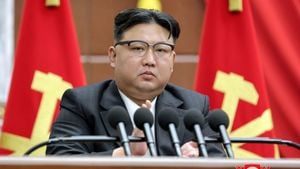The world stage is buzzing with new developments as the European Union (EU) recently widened its sanctions against Iran for its military support of Russia, particularly amid the backdrop of the latter's invasion of Ukraine. The sanctions have significant ramifications not only for Iran but also for the broader geopolitical tensions involving Russia and the West.
On Monday, the EU announced restrictions targeting Iranian vessels and ports implicated in transferring drones and missiles to Russia. This decision to ramp up sanctions signifies the bloc's commitment to counteract the military collaboration between Tehran and Moscow and is particularly relevant as the conflict between Ukraine and Russia enters another tumultuous phase.
These latest sanctions are not just symbolic; they include prohibiting the export, transfer, supply, or sale of any components from the EU to Iran used to create missiles and unmanned aerial vehicles (UAVs). Specifically, this move is aimed at regions such as the Iranian ports of Amirabad and Anzali, highlighting the substantial role these locations play in facilitating the arms trade between Iran and Russia.
While the EU’s measures have been welcomed by some as necessary actions to maintain pressure on regimes accused of undermining global stability, Iran responded with indignation. Foreign Minister Abbas Araghchi criticized the sanctions as unjustified, claiming they stem from what he described as "non-existent" missile pretexts used by the EU to justify their actions against Iran's shipping lines. Araghchi asserted, "Freedom of navigation is a basic principle of the law of the sea. When selectively applied by some, such shortsightedness usually tends to boomerang," illustrating Tehran's strong pushback against what it perceives as Western overreach.
The sanctions package included actions against three Russian shipping firms believed to be involved in transporting Iranian military supplies. This coordinated effort demonstrates the EU's attempts to clamp down on arms flowing to Russia, showing enhanced vigilance against the mechanisms sustaining this international partnership.
Britain has taken similar actions by announcing fresh sanctions against Iran, freezing assets linked to the Iranian state shipping company IRISL and its director for their roles in transporting missiles and military supplies to Russia. Notably, the UK also barred the sanctioned Russian cargo ship Port Olya-3 from entering any of its ports. These coordinated moves signify not only the strategic alignment of Western nations against Iranian support for Russia but also highlight the lengths to which they will go to disrupt the logistical base of their adversaries.
Adding another layer to this complex situation, recent reports from the Bureau of Industry and Security (BIS) showed the United States also tightening export controls against both Russia and Iran. The measures aim to augment existing restrictions as Washington looks to hinder Russian capabilities allegedly supported by Iranian technology, including UAVs used against Ukraine.
The developments come at a time when the international community is keeping close tabs on the effects of sanctions and their efficiency. The EU's previous sanctions efforts following the 2014 annexation of Crimea serve as important lessons, with European Commissioner Ursula von der Leyen stating, "We will continue to apply maximum pressure against Russia until Ukraine has re-established just peace." This renewed resolve reflects Europe’s intent to maintain its sanctions strategy irrespective of changing political winds, particularly with Donald Trump’s potential return as U.S. president.
Trump, known for his previous sanctions-heavy approach, raised eyebrows across Europe and beyond as he hinted at reclosing relationships with Russia if re-elected. Observers are wary; recent discussions suggest he could potentially ease sanctions previously established against Russia, which might disrupt the transatlantic alliance’s coherence. European circles have expressed concern about whether they can rely on the U.S. as they have during the current conflict.
Much speculation surrounds how Trump’s leadership might influence Europe's stance on sanctions. His first presidency saw aggressive sanctions against Iran, especially following the U.S. withdrawal from the landmark Iran nuclear deal. His style of politics, characterized by unpredictable and sometimes informal negotiation tactics, could pose challenges for European leaders balancing their actions on sanctions with newly adjusted U.S. policies.
With sanctions woven deeply within the fabric of global diplomacy and geopolitical strategy, the current European leadership stands firm. The recent move against Iran serves as both a defensive and offensive strategy against aggression from both Tehran and Moscow. Europe’s commitment to sanctions remains resolute, marking significant moments of determination amid shifting alliances and power dynamics.
Observers are also noting the importance of financial responsiveness to the sanctions, as Europe enhances its diplomatic dialogue with third-party nations involved with Russia. This is particularly relevant since Russia continues to find ways to finance its defense needs, leveraging connections with nations previously unnamed but potentially complicit.
Beyond legal retribution, the pressure these sanctions create has to be actively enforced to hinder circumvention attempts. European officials are tasked with ensuring comprehensive compliance not only within their jurisdictions but also through direct interaction with third-nation signatories and partners who could provide logistical support to Russia.
Strategically, it is imperative for Europe to convert high-level discussions surrounding sanctions enforcement to actionable measures at the ground level. The development of effective sanctions frameworks has been painstakingly honed over nearly three years, and officials aim to solidify this apparatus, especially if trust and partnership with the U.S. appears strained under shifting political climates.
Interaction with third countries is also set to be more tightly monitored, aiming to prevent any support to Russia's war capabilities. Cultivated relationships between European entities and nations even tangentially involved with Russia or Iran must be under persistent scrutiny to prevent any form of sanctions evasion.
Looking to the future, Europe must remain vigilant, adapting to new realities and potential challenges posed by both Russia and Iran as they navigate their roles within the global arena. Ensuring sanctions remain effective will demand mobilized intelligence, awareness, and diplomatic finesse to manage both existing and forthcoming geopolitical situations.
The stakes are exceedingly high as Europe looks to understand the nuances of international cooperation amid crises. Each sanction leveled sends ripples through global politics, creating spaces for negotiation, signaling deterrence, and at times, risking escalation. The international community's eyes will remain fixed on how these dynamics evolve, particularly how the actions taken today by the West weigh against the broader geopolitical contest between rogue states and established democracies.



